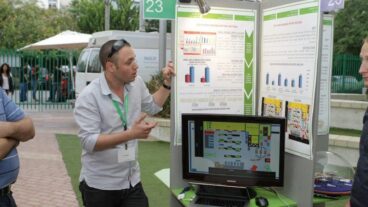The main aim of the International Stem Cell Forum is to produce international scientific benchmarks on the characteristics of new and existing stem cell lines.Israeli scientists are teaming up with their counterparts from 12 countries to launch a new organization designed to promote collaboration on stem cell research and to accelerate the development of new medical treatments.
The International Stem Cell Forum was created at a meeting chaired by the UK’s Medical Research Council (MRC) in London on July 11. The launch comes just six months after the MRC announced it was setting up an informal discussion forum to tackle stem cell research on a global rather than national basis.
The main aim of the new organization is to produce international scientific benchmarks on the characteristics of new and existing stem cell lines. This will be achieved by inviting researchers from major institutions in each of the member countries to examine cell lines, using standardized tools and procedures.
Together with the UK representatives, signatories include the US National Institutes of Health, the National Health and Medical Research Council of Australia, the Canadian Institutes of Health Research, and the Israel Academy of Sciences and Humanities. The other states involved in the collaboration are Germany, France, Japan, Finland, Singapore, the Netherlands, and Sweden.
“Israel is happy to contribute to this international coordination effort,” said Professor Michel Revel, the Chairman of the Molecular Genetics Department at the Weizmann Institute of Science, and the chairman of The Bioethics Advisory committee of The Israel Academy of Sciences and Humanities. “The initiative is attempting to coordinate and to standardize the human embryonic stem cell research that exists in different countries.”
According to Revel, Israel’s inclusion in the new group demonstrates that it is a leader in human embryonic stem cell research.
“There has been great progress in developing this new technology to be used for transplants, diabetes research, heart repair and in the farther future, treating brain damage. Several groups in Israel have produced cell lines from
human embryos, which have been donated or left over from IVF treatments. The alternative would have been to destroy them,” said Revel.
As head of The Bioethics Advisory committee of The Israel Academy of Sciences and Humanities, Revel wrote and published a report called The Use of Embryonic Stem Cells for Theraputic Research in 2001, which was adopted as the official policy of the Israel Ministry of Health. The report discussed the
ethical and religious debate about using human embryos. He lauded the formation of the forum, especially at a time when there are movements in the United States and European countries like Germany and Austria are protesting this type of research.
“It’s an important initiative at a time when the UN is faced with requests from some countries to stop any research on cloning technology, including embryonic stem cell research. There was a big change in the US following the Bush
administration’s entry agains the use of human embryos for research that may lead to cloning and other type of acitvities they find to be not compatible with their standards,” said Revel.
As part of the Forum’s activities, a new registry of stem cell lines, which will be made available on a dedicated Web site, is being developed under the leadership of Peter Andrews from the Centre for Stem Cell Biology at the
University of Sheffield.
The creation of the group addresses concerns that in the race to explore new applications for stem cell technology, teams of scientists around the world could end up working to different criteria or duplicating one another’s efforts.
The idea behind the forum is to prevent duplication and to coordinate research as much as possible, speeding up research by sharing information.
“New cell lines are being produced all the time, and the idea is to standardize the type of research which is allowed on these cells, and to harmonize the ethical regulations that are used in different countries on stem cell research,” said Revel.
The United Kingdom will take charge of the drive to characterize cell lines, and representatives from Australia and Canada have agreed to explore ethical and patenting issues.
MRC Chief Executive George Radda said in a press statement: “International coordination will accelerate progress in this cutting-edge area of research, maximizing health benefits for the global public.”
James Battey from the US National Institutes of Health said he hoped the initiative would allow US scientists to “harmonize” their research efforts with those elsewhere. He told The Scientist, “A standardized approach to characterizing human embryonic stem cell lines throughout the international research community will reveal similarities and differences between the properties and potential of lines established at different times under different experimental protocols. Such an effort will undoubtedly accelerate the pace of discovery.”
According to Andrews, a “task force” of four or five representatives has been formed to establish a program of work for the forum for the next year.
“We’ll do it in bite-sized chunks because it’s such a huge project,” he told The Scientist. “It’s a question of working on the key parts, such as how to characterize cell lines, how to stop them doing things you don’t want them to do, and how to get them to differentiate into cells that you want.
“There is a huge amount of promise in stem cell research but also a huge amount of hype, so we have to be careful what we tell people. It could take 15 to 20 years, but there’s a good chance we could produce therapies that are really revolutionary for diseases that cripple a lot of people,” said Andrews.












